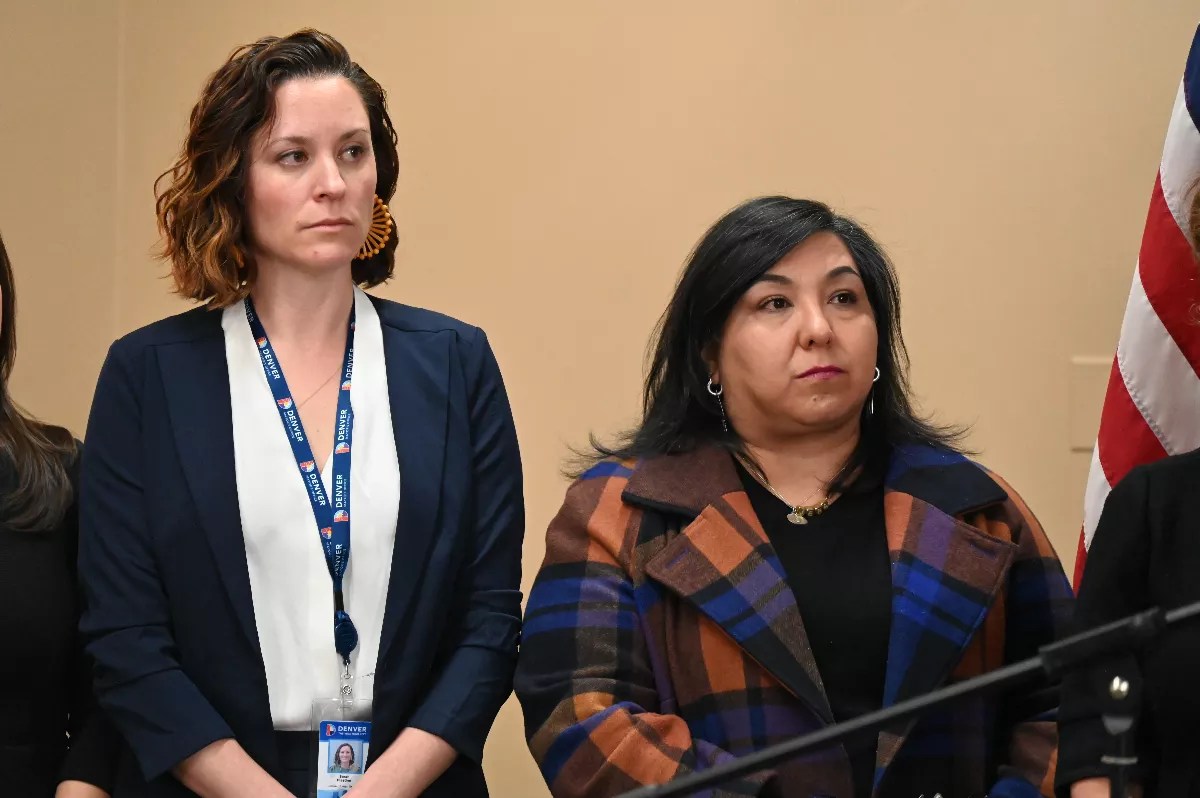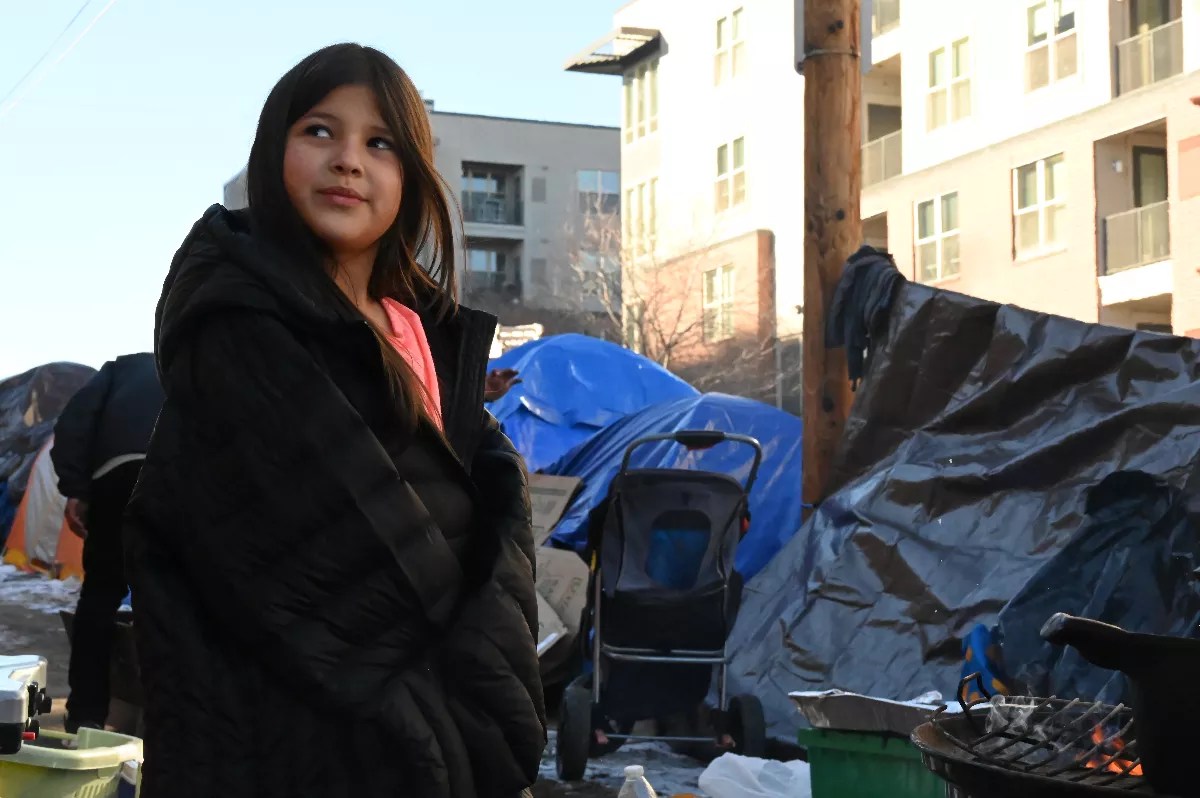
Bennito L. Kelty

Audio By Carbonatix
In December 2022, the City of Denver declared an emergency after the arrival of thousands of migrants from the southern border. Since then, nearly 40,000 of them have come to the city.
The response has cost Denver $61 million so far and could cost another $120 million in 2024, according to city estimates, but Mayor Mike Johnston believes his new director of Denver’s Newcomer Program will steer the city toward a more sustainable path.
Now a month into her role, Sarah Plastino’s duties include compassion to migrants while shifting the city’s strategy from emergency response to a long-term plan. An immigration defense lawyer, Plastino told a small group of reporters during an interview on Wednesday, March 20, that this is “a refugee crisis” that is “going to unfold over a decade.”
“A quarter of the population of Venezuela has left the country since 2015. This is a refugee flow,” she explained. “People left Venezuela because their government created a life-threatening crisis where they are not able to access basics of life, including food.”
The departure of millions of Venezuelans from their country to places like Denver “is one of the hugest flows of displacement in our hemisphere in decades,” Plastino said.
The City of Denver is facing a $120 million shortfall in funding if it continues to deliver migrant services at the same rate that it was in January, when as many as 5,000 migrants were staying in city-operated shelters across Denver.
“Nobody wants large cuts that cause pain, no one wants to see layoffs, nobody wants to see furloughs,” Plastino said. “My colleagues across the government have been looking for a way we can reduce in a way that doesn’t impact our communities.”
A Philadelphia native, Plastino has more than fifteen years of experience as a human rights and immigration defense lawyer in the United States and Latin America. She moved to Denver in 2017 to work as an attorney for the Rocky Mountain Immigrant Advocacy Network before becoming a professor at the University of Denver Sturm College of Law from 2019 to 2021.
In 2021, Plastino started her own consulting firm to offer legal and policy expertise on immigrant rights, and she has been on the board of directors for the Colorado Immigrant Rights Coalition Action Fund since 2022.
Plastino, who will be making about $175,000 per year in her new role, said she will “lead this response with compassion,” but also with a “goal of making it financially sustainable for the city.”
“My philosophy coming into this job is compassion and sustainability and making sure we balance those,” she added. “Absolutely, it’s a priority of mine to get this program in a financially sustainable place.”
Plastino expects to have a detailed plan and budget for the city’s migrant response “in the coming weeks” before she’s scheduled to appear in front of Denver City Council in April.
About 34 percent of the money Denver has spent so far on migrant services is for hotel lodging, according to the Denver Human Services Department. Payroll for staff at these hotels is 32 percent of that spending, hotel security is 5 percent, and food accounts for 11 percent. Bus tickets for migrants who arrive in Denver but want to go elsewhere accounts for about 11 percent, while the remaining expenses pay for inner-city transportation for migrants, medical help, and supplies like diapers and baby food.

Plastino stands next to Denver City Council President Jamie Torres as Mayor Johnston details his migrant response strategy.
Bennito L. Kelty
Johnston was hopeful in January that Congress would approve a $ 1.4 billion border security bill that would have sent money to local jurisdictions to support migrants, but the bill died in the U.S. Senate in early February. Plastino still hopes the federal government will provide help, however.
“Thus far, we’ve had to mostly rely on our own resources and assistance from the state,” Plastino pointed out. “We’re hopeful that the federal government will take action to assist, take action to provide solutions to immigration reform.”
If not financial aid, the federal government could at least help create more pathways for work authorization for migrants who arrive, according to Plastino, who said that very few migrants get work authorization through CBP One, an app that allows them to set up appointments with immigration officials and enter the country on parole, allowing them to work right away.
Most migrants apply for asylum but have to wait six months after applying to work as they wait for court dates. Many “will not get decisions on their cases for years” because of a backlog in cases, Plastino said.
The federal government did give Venezuelan migrants who arrived before August 2023 the benefit of Temporary Protected Status, a designation that protects people fleeing humanitarian crises in their own countries and allows them to stay and work in the U.S.
However, more and more migrants who aren’t eligible for TPS are arriving in Denver.
“We would really like to see a reissuance of TPS,” Plastino noted. “All the folks who came into our shelter system in December and January, they don’t qualify for TPS.”
So far, the City of Denver has helped 1,400 migrants get work permits through legal clinics, which Plastino called “an amazing, amazing number.”
“We’re also diligently working through our job-force programs to match those folks with open jobs,” she added.
Migrants are asking for their asylum court hearings to take place in Denver, which is drawing many here, according to Plastino, while some migrants also have to come to Denver to do in-person check-ins with Immigration and Customs Enforcement (ICE).
Chain migration is also a common path to Denver for migrants. “Many people have family and friends here. We know chain migration is always a common pattern,” Plastino said. “A community establishes roots, and the remainder of family and friends join them.”

Eight-year-old Aranza Delgado at the migrant encampment that used to be outside the Quality Inn at 2601 Zuni Street.
Bennito L. Kelty
Denver Migrant Shelters
Johnston has been able to whittle down the deficit for migrant services – originally $180 million – to $120 million by closing four migrant shelters during the month of March. The move leaves three hotels for most of Denver’s migrant sheltering, along with two transitional shelters and a shelter on standby.
Denver is discharging about 500 migrants a week when their length-of-stay is up, according to Plastino. Length-of-stay, or how long a migrant can stay in a shelter, is limited to 42 days for families with children and fourteen days for individuals.
“We’re not cutting anyone’s length-of-stay short,” she noted. “We’re consolidating people into one hotel since they’ve been scattered, and it makes fiscal sense to decommission hotels if they’re only partially full.”
Plastino is coming into her position during a lull in Denver’s migrant arrivals. For the first time since September, Denver had fewer than 1,000 migrants currently staying in its shelters as of Wednesday, March 20. This gives her and her team “a bit of breathing room.”
“That is an important turning point for the city,” she said. “Two months ago, that looked really different. We were at our high, and we were in the throes of an emergency response. And right now we are shifting to a long-term, more programmatic model response. We’re trying to be deliberate. We’re trying to be proactive.”
There are also two transitional shelters: the Mullen Home, for families and pregnant women, and the Denver Community Church, for single adults. The McNichols Building is on standby for cold weather to shelter anyone who is homeless, including migrants and local residents. About 200 migrants are staying at the Mullen Home.
“It’s not that we’re offering less space. The shelters that are open have plenty of space,” Plastino explained. “We’re not turning anyone away. We’re just utilizing a fewer number more efficiently.”
Plastino acknowledged that the number of migrants in Denver fluctuates with the season, however, with more arrivals usually coming during warmer weather. She expects the number of migrant arrivals “to ramp up potentially as the spring comes.” (December and January had a record-high number of migrants in shelters because the city wasn’t discharging anyone for weeks at a time during a cold-weather shelter activation, not to be confused with the number of arrivals during those months.)
If the number of migrant arrivals jumps again in Denver, the city “is prepared for something like that” even though it has fewer hotels than it did a two months ago, Plastino said – though she didn’t provide details about the city’s potential response.
“We are developing a plan that we can operationalize very quickly in the event that something like that happens,” she said. “Right now, we aren’t activating new congregate sites. We don’t have a need for that.”
With hundreds of migrants leaving shelters each week without work permits, Plastino is worried about more homelessness, but she believes the city is working hard to transition migrants into stable living situations.
“When a large number of people are leaving shelter in a very short period of time, that is something that we are working very hard to prevent negative outcomes,” she said. “We’re working with many community partners on case management and transitional housing and getting folks into long-term leases.”
So far, the city’s efforts have been “very successful,” according to Plastino, who will have “no tolerance for children in encampments.
“We have seen very few encampments, children on the street,” she said. “Anytime we identify a family that is on the street or has any plans to sleep outside that night, we’ll immediately mobilize to find transitional housing.”
Plastino, who speaks Spanish, says that she talks to migrants “all the time” in her neighborhood and at migrant shelters she visits. She also encounters migrant parents at her son’s elementary school in Denver, which has received a lot of migrant students since 2022.
Like other Johnston-appointees, Plastino believes in “people-centered language,” and prefers to refer to migrants as “asylum-seekers” or “newcomers.” This is also because “migrant” refers to people who migrate for work, and that’s not entirely why Venezuelans are here.
“Because people want to work so bad, there’s a misconception that people came here to work,” Plastino pointed out during the March 20 interview.
“What I really do care about is that people understand these are not economic migrants,” she concluded. “You can be a refugee and still want to have a good future for your family financially. Even under the law, you can have mixed motivations for coming and still get asylum status.”